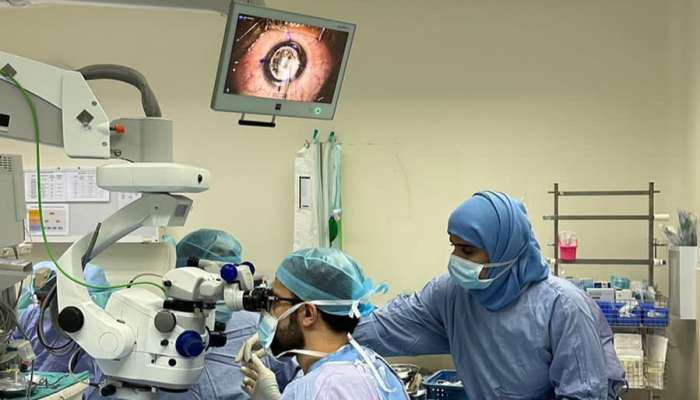
Muscat: In a two and a half hours operation, a specialised medical team of the eye department of Al Nahdha Hospital succeeded in performing the first partial anterior corneal transplant for a 28-year-old patient suffering from keratoconus,
Dr. Haitham bin Hilal Al Mahrouqi, senior specialist in corneal transplants, cataracts and vision correction at Al Nahdha Hospital, explained that a corneal transplant may be total or partial, but partial transplants have several advantages, including fewer complications and a faster recovery period after the operation.
Al Mahrouqi stated that the result of the body’s rejection of the transplanted cornea is less and the life span of the cornea is longer. There is a current global trend to perform this type of operation due to the great advantages, he said, adding that not all cases need partial transplants, but some do require full corneal transplants.
Al Mahrouqi stressed that performing this type of operation in the Sultanate of Oman reflects the competence of the Omani cadres, who are qualified to perform this type of operation and ensure the quality of healthcare provided to patients.
He said that when corneal transplant operations were restarted 3 months ago, 25 complete cornea transplant operations were undertaken.
The cases that require partial corneal transplant operations are due to the presence of a disease in part of the cornea, such as scars in the cornea or keratoconus, or the presence of some genetic diseases, pointing out that the body’s rejection of a partial corneal transplant is at a lower rate of up to 5 percent compared to a total transplant which may reach between 15 and 20 percent.
Rejection is also due to other reasons that require continuous follow-up with the specialist doctor, and proper use of the medication.
The National Organ Transplant Program seeks to localise the corneal transplant service in the Sultanate of Oman through the presence of an eye bank that collects and preserves corneas from donors within the Sultanate of Oman during the next five years to achieve self-sufficiency and provide this service in all governorates of the Sultanate of Oman and not be limited to the Muscat Governorate.
Restarting corneal transplant operations at Al Nahdha Hospital contributed to achieving many positives, including localising the service and achieving self-sufficiency in corneal tissue with the presence of qualified national cadres, ensuring quality healthcare provided to patients, and reducing sending cases for treatment abroad, in addition to saving time, effort and money.